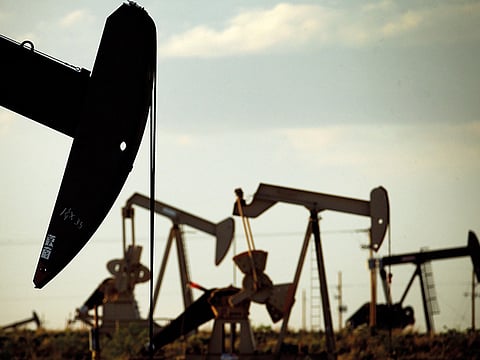Opec is set to extend output cuts amid dampening demand
Crucial meeting of Opec and its allies in Vienna on July 1 and 2

Abu Dhabi: Opec is set to extend its oil production cuts into the second half of this year amid dampening demand and a rise in global oil inventories.
Saudi Arabia’s energy minister Khalid Al Falih said on Twitter that Russian President Vladimir Putin and Crown Prince Mohammad Bin Salman agreed to extend the agreement starting from July.
“Once again, the agreement confirms that the Saudi-Russian partnership paves the way for ensuring the interests of producers and consumers and sustaining the growth of the world economy,” said Al Falih ahead of a crucial meeting of Opec and its allies on Monday and Tuesday in Vienna.
The extension is likely to be for nine months, he told reporters after arriving in Vienna.
Putin also confirmed the deal would be extended in its current form and with the same volumes.
“We will support the extension, both Russia and Saudi Arabia. As far as the length of the extension is concerned, we have yet to decide whether it will be six or nine months. Maybe it will be nine months,” said Putin, who met the crown prince of Saudi Arabia on the sidelines of a G20 summit in Japan.
The comments pertaining to the extension of the deal come as oil prices continue to be under pressure on demand concerns due to the US-China trade war as well as rising global oil inventories following record oil production from the US.
Brent, the global benchmark, was trading at $64.74 (Dh237.7) per barrel, down by 1.42 per cent when markets closed on Friday. West Texas Intermediate was down by 1.62 per cent at $58.47 per barrel.
Analysts said there is a downside risk for oil demand through the rest of the year if the ongoing trade war intensifies.
“Our forecast assumes no further trade war escalation. On that basis, we expect a tightening in the supply and demand balance in the second half of 2019, which supports prices. Brent is forecast to average $68 per barrel for 2019 as a whole, and $69.50 per barrel in the second half of 2019,” said Ann-Louise Hittle, vice president, Macro Oils, at Wood Mackenzie.
She also said year-on-year, Opec crude oil production for 2019 is expected to decline by 1.8 million barrels per day, with more than half of that reflecting the impact of US oil sanctions on Iran and Venezuela.
On Opec compliance to the deal, she said it is strong, except for Iraq and Nigeria.
“In May this year, Saudi Arabia had cut its production by more than 0.8 million barrels per day from its October 2018 reference level. This is far more than required.”
“Adherence to quotas is strong from United Arab Emirates and Kuwait, as well as Algeria and Congo. But Libya, which is exempt from production restraint, saw a recovery in its output in May to around 1.1 million barrels per day.”
The market also faces the uncertainty of the escalation of threats between the US and Iran posing a risk to oil supplies.
Tensions between the US and Iran rose in recent times following attacks on oil tankers and Saudi oil installations with US President Donald Trump saying that he was planning to attack Iran but did not go ahead as it would involve the death of 150 people.
“Extension of the deal would be bullish for oil prices. It is also good to see US, China are trying to sort out their trade related differences as was seen during G20 summit, which will push prices higher,” said Essam Kassabieh, senior analyst with Menacorp.
Meanwhile, UAE energy minister Suhail Al Mazroui expressed confidence that the alliance will reach a decision to balance oil markets.
“On the way to Vienna to attend JMMC/Opec and Opec-DOC meetings, hoping for a good and productive outcomes. I am confident the alliance will reach a decision that will restore oil market balance,” he tweeted on Sunday.



